Abstract
The undesired effects of data gathered from real world can be produced by the noise in the process, the bias of the sensors and the presence of hysteresis, among other uncertainty sources.
Data gathered by this way are called Low Quality Data (LQD). Thus, uncertainty representation tools are needed for using in learning models with this kind of data.
This work presents a method to represent the uncertainty and an approach for learning white box Equation Based Models (EBM). The proficiency of the representations with different noise levels and fitness functions typology is compared.
The numerical results show that the use of the described objectives improves the proficiency of the algorithms. It has been also proved that each meta-heuristic determines the typology of fitness function.
Access this chapter
Tax calculation will be finalised at checkout
Purchases are for personal use only
Preview
Unable to display preview. Download preview PDF.
References
Berzosa, A., Villar, J.R., Sedano, J., García-Tamargo, M., de la Cal, E.: An Study of the Tree Generation Algorithms in Equation Based Model Learning with Low Quality Data. In: Corchado, E., Kurzyński, M., Woźniak, M. (eds.) HAIS 2011, Part II. LNCS, vol. 6679, pp. 84–91. Springer, Heidelberg (2011)
Brameier, M., Banzhaf, W.: Explicit Control of Diversity and Effective Variation Distance in Linear Genetic Programming. In: Foster, J.A., Lutton, E., Miller, J., Ryan, C., Tettamanzi, A.G.B. (eds.) EuroGP 2002. LNCS, vol. 2278, pp. 37–49. Springer, Heidelberg (2002)
Couso, I., Sánchez, L.: Higher order models for fuzzy random variables. Fuzzy Sets Syst. 159, 237–258 (2008)
Ekárt, A., Németh, S.Z.: A Metric for Genetic Programs and Fitness Sharing. In: Poli, R., Banzhaf, W., Langdon, W.B., Miller, J., Nordin, P., Fogarty, T.C. (eds.) EuroGP 2000. LNCS, vol. 1802, pp. 259–270. Springer, Heidelberg (2000)
Folleco, A., Khoshgoftaar, T.M., Van Hulse, J., Napolitano, A.: Identifying learners robust to low quality data. Informatica (Slovenia) 33(3), 245–259 (2009)
Howard, L., D’ Angelo, D.: The ga-p: a genetic algorithm and genetic programming hybrid. IEEE Expert 10, 11–15 (1995)
Koza, J.R.: Genetic Programming: On the Programming of Computers by Means of Natural Selection. MIT Press, Cambridge (1992)
Lee-Kwang, H., Lee, J.-H.: Method for ranking fuzzy numbers and its application to decision-making. IEEE Transactions on Fuzzy Systems 7(6), 677–685 (1999)
Luengo, J., Herrera, F.: Domains of competence of fuzzy rule based classification systems with data complexity measures: A case of study using a fuzzy hybrid genetic based machine learning method. Fuzzy Sets and Systems 161(1), 3–19 (2010); Special section: New Trends on Pattern Recognition with Fuzzy Models
Sánchez, L.: Interval-valued gap algorithms. IEEE Transactions on Evolutionary Computation 4, 64–72 (2000)
Sánchez, L., Couso, I., Casillas, J.: Genetic learning of fuzzy rules based on low quality data. Fuzzy Sets and Systems 160(17), 2524–2552 (2009)
Sánchez, L., Couso, I., Corrales, J.A.: Combining gp operators with sa seach to evolve fuzzy rule classifiers. Information Sciences 136, 175–192 (2001)
Sánchez, L., Rosario Suárez, M., Villar, J.R., Couso, I.: Mutual information-based feature selection and partition design in fuzzy rule-based classifiers from vague data. Int. J. Approx. Reasoning 49, 607–622 (2008)
Sánchez, L., Villar, J.R.: Obtaining transparent models of chaotic systems with multi-objective simulated annealing algorithms. Inf. Sci. 178, 952–970 (2008)
Slowik, A.: Fuzzy Control of Trade-off Between Exploration and Exploitation Properties of Evolutionary Algorithms. In: Corchado, E., Kurzyński, M., Woźniak, M. (eds.) HAIS 2011, Part I. LNCS, vol. 6678, pp. 59–66. Springer, Heidelberg (2011)
Villar, J.R., Berzosa, A., de la Cal, E., Sedano, J., García-Tamargo, M.: Multi-objective learning of white box models with low quality data. Neurocomputing (in Press)
Villar, J.R., Otero, A., Otero, J., Sánchez, L.: Taximeter verification using imprecise data from gps. Eng. Appl. Artif. Intell. 22, 250–260 (2009)
Author information
Authors and Affiliations
Editor information
Editors and Affiliations
Rights and permissions
Copyright information
© 2012 Springer-Verlag Berlin Heidelberg
About this paper
Cite this paper
de la Cal, E., Villar, J.R., García-Tamargo, M., Sedano, J. (2012). Comparison of Fuzzy Functions for Low Quality Data GAP Algorithms. In: Corchado, E., Snášel, V., Abraham, A., Woźniak, M., Graña, M., Cho, SB. (eds) Hybrid Artificial Intelligent Systems. HAIS 2012. Lecture Notes in Computer Science(), vol 7209. Springer, Berlin, Heidelberg. https://doi.org/10.1007/978-3-642-28931-6_33
Download citation
DOI: https://doi.org/10.1007/978-3-642-28931-6_33
Publisher Name: Springer, Berlin, Heidelberg
Print ISBN: 978-3-642-28930-9
Online ISBN: 978-3-642-28931-6
eBook Packages: Computer ScienceComputer Science (R0)

